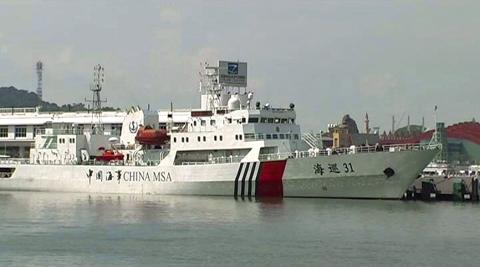Singapore yesterday urged China to be more open about the extent of its territorial claims in the South China Sea (SCS), saying Beijing’s ambiguity was causing international concern.
The Singaporean Foreign Ministry said while it had no claims of its own, the city-state was a major trading nation whose interests could be affected by issues relating to freedom of navigation in the area.
Tensions between China and other rival claimants to the strategically vital South China Sea — home to two potentially oil-rich archipelagos the Paracel Islands (西沙群島) and the Spratlys Islands (南沙群島) — have escalated in recent weeks.

Photo: Reuters
The Philippines and Vietnam in particular have expressed alarm at what they say are increasingly aggressive actions by China in the disputed waters, but Beijing has insisted it is committed to resolving the issue peacefully.
Singapore’s statement was issued after a Chinese surveillance vessel, the Haixun 31, docked in the city-state after passing through the South China Sea.
“We ... think it is in China’s own interests to clarify its claims in the SCS with more precision as the current ambiguity as to their extent has caused serious concerns in the international maritime community,” the Singapore statement said.
“Singapore is not a claimant state and takes no position on the merits or otherwise of the various claims in the SCS,” it added. “But as a major trading nation, Singapore has a critical interest in anything affecting freedom of navigation in all international sea lanes, including those in the SCS.”
Manila on Friday said it would deploy its naval flagship to the South China Sea a day after China announced the Haixun 31’s mission, while up to 100 Vietnamese rallied outside the Chinese embassy in Hanoi for the third weekend in a row against Beijing’s claims.
Vietnam and China have held separate live-fire military exercises in the area after Hanoi accused Chinese ships of ramming one oil survey ship and cutting the exploration cables of another.
Taiwan, the Philippines, China, Brunei, Malaysia and Vietnam claim all or part of the territories in question.

PRECARIOUS RELATIONS: Commentators in Saudi Arabia accuse the UAE of growing too bold, backing forces at odds with Saudi interests in various conflicts A Saudi Arabian media campaign targeting the United Arab Emirates (UAE) has deepened the Gulf’s worst row in years, stoking fears of a damaging fall-out in the financial heart of the Middle East. Fiery accusations of rights abuses and betrayal have circulated for weeks in state-run and social media after a brief conflict in Yemen, where Saudi airstrikes quelled an offensive by UAE-backed separatists. The United Arab Emirates is “investing in chaos and supporting secessionists” from Libya to Yemen and the Horn of Africa, Saudi Arabia’s al-Ekhbariya TV charged in a report this week. Such invective has been unheard of

US President Donald Trump on Saturday warned Canada that if it concludes a trade deal with China, he would impose a 100 percent tariff on all goods coming over the border. Relations between the US and its northern neighbor have been rocky since Trump returned to the White House a year ago, with spats over trade and Canadian Prime Minister Mark Carney decrying a “rupture” in the US-led global order. During a visit to Beijing earlier this month, Carney hailed a “new strategic partnership” with China that resulted in a “preliminary, but landmark trade agreement” to reduce tariffs — but

Chinese President Xi Jinping’s (習近平) purge of his most senior general is driven by his effort to both secure “total control” of his military and root out corruption, US Ambassador to China David Perdue said told Bloomberg Television yesterday. The probe into Zhang Youxia (張又俠), Xi’s second-in-command, announced over the weekend, is a “major development,” Perdue said, citing the family connections the vice chair of China’s apex military commission has with Xi. Chinese authorities said Zhang was being investigated for suspected serious discipline and law violations, without disclosing further details. “I take him at his word that there’s a corruption effort under

China executed 11 people linked to Myanmar criminal gangs, including “key members” of telecom scam operations, state media reported yesterday, as Beijing toughens its response to the sprawling, transnational industry. Fraud compounds where scammers lure Internet users into fake romantic relationships and cryptocurrency investments have flourished across Southeast Asia, including in Myanmar. Initially largely targeting Chinese speakers, the criminal groups behind the compounds have expanded operations into multiple languages to steal from victims around the world. Those conducting the scams are sometimes willing con artists, and other times trafficked foreign nationals forced to work. In the past few years, Beijing has stepped up cooperation